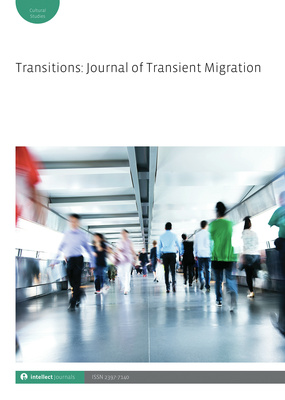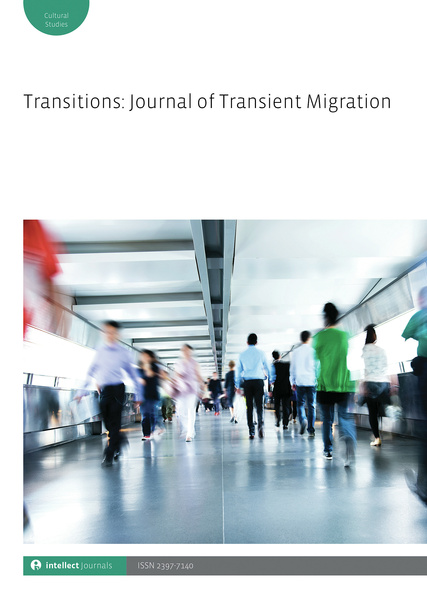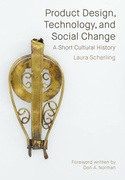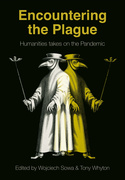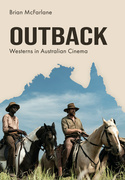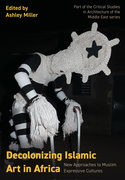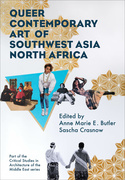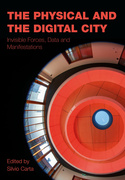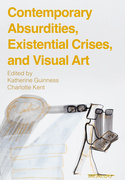General Call for Papers
All articles submitted should be original work and must not be under consideration by other publications.
Transitions is a multi-disciplinary journal which brings together individual scholars and groups working across the humanities and social sciences and includes the areas of media, politics, culture, history, policy, economy and the creative industries. Transitions will focus on but is not limited to themes such as belonging, identity, networks, nation, culture, religion, race and ethnicity, gender, precarity, memory, agency, community, quotidian encounters and homecoming and the roles various platforms play within these themes.
Submissions to Transitions are welcome all year. We welcome both qualitative and quantitative studies and will be issuing calls for themed issues every year. Your paper may address any of the themes above or highlight an issue not within that list. We accept papers between 6,000 and 10,000 words. Transitions use the Harvard Style of referencing, but you are requested to refer to Intellect House Style Guidelines for a guide on the referencing and writing styles that apply. Submissions not in line with the house styles will not be considered. You should receive an acknowledgement of receipt within ten days. For more information, please get in touch with our editors Catherine Gomes (catherine.gomes@rmit.edu.au), Peidong Yang (y.peidong@gmail.com) and Helena Hof (helena.hof@aoi.uzh.ch).
Call for Special Issue (SI) Proposals
At Transitions, we welcome special issue proposals from potential guest editors. Please contact Catherine Gomes (catherine.gomes@rmit.edu.au) and Peidong Yang (y.peidong@gmail.com) if you want to propose a special issue.
Call For Reviews / Practitioners Review
Transitions seeks scholastic reviews on the latest books, practices, policies, media and interviews with practitioners as they relate to our journal. If you have something you would like us to review or a review that you would like to write, please send your inquiry to Helena Hof at review.transitions@gmail.com.
Download the Notes for Contributors here.
Journal contributors will receive a free PDF copy of their final work upon publication. Print copies of the journal may also be purchased by contributors at half price.
Special Issue Call for Papers
‘Casteism Across Borders: Mapping the Diasporic Reproduction of Caste Discrimination and Anti-Caste Struggles’
Guest editors: Dr Vikrant Kishore, Dr Stephen Goulding, Dr Ratan Lal
This Special Issue of Transitions: Journal of Transient Migration will explore the complex and often overlooked perpetuation of casteism and anti-caste activism in South Asian diasporic communities around the globe. Caste, as a deeply ingrained and longstanding system of social hierarchy, continues to generate and legitimize immaterial and material divisions and deprivation in South Asian societies. Indeed, recent research has highlighted the durability of caste and its divisive formulations – ‘hierarchy, patriarchy, humiliation, deprivations, exclusions, and economic disparities’ (Jodhka and Naudet 2023: 26.)—in the face of shifting social and temporal contexts.
Nevertheless, some key concerns noted in academic discourse, but which remain largely underappreciated by scholars thus far, are how casteism reproduces itself and transforms as it crosses national borders and perseveres as a dynamic and fluid force in South Asian diasporic communities around the globe (Modi 2023). Relatedly, efforts to resist casteism and extricate diasporic communities from the caste system remain similarly underexplored by researchers. Despite the physical distance from their countries of origin, diasporic communities carry with them a multitude of cultural, social, and political legacies, among which caste remains a significant and contentious element, manifesting at the intersection of host countries, migrant communities, and states of origin (Mégret and Dutta 2022). Research suggests that the varied routes and modes of migration of the South Asian community have seen both the reproduction and abatement of caste practices and beliefs, with voluntary, economically driven migration, in particular, maintaining a ‘stronger alliance with the caste system’ (Modi 2023: 774). However, existing research has largely failed to adequately address how casteism – as discrimination, prejudice, and hate on the grounds of caste – has translated or transmuted in these varied geographical contexts.
This issue aims to provide a timely contribution to research by exploring the manifestations of diasporic caste baggage and casteism, examining how these inherited practices of division and discrimination are both preserved and contested in new socio-cultural landscapes. By shedding further light on how caste discrimination manifests and can be challenged in the globe's largest diasporic community, this issue hopes to provide a diverse contribution to knowledge that highlights the multifaceted ways in which prejudice, divisions, and inequalities associated with casteism are reproduced, transformed, or resisted in global diasporic communities. Thus, we are keen to include in this Special Issue contributions that highlight the (im)material causes and ramifications of casteism in South Asian diasporic communities and draw attention to social, cultural, political, and legal routes to emancipation from casteist practices and beliefs.
While the primary goal of this Special Issue is to contribute to a deeper understanding of how casteism as a form of prejudicial social stratification travels and transforms, and how diaspora groups in diverse global contexts are actively challenging it, we also seek to highlight the resilience and agency of diasporic communities in navigating and negotiating their caste identities, and in doing so, to contribute to the broader discussions on race, ethnicity, and discrimination— thereby enriching the discourse on transient migration and transnational identities.
Topics to be addressed might include (but are not limited to):
- Casteism and legal frameworks in host countries
- Intersectionality of caste with race and ethnicity in migrant communities
- Role of ethnic media in perpetuating/abating caste discrimination
- Representations of diasporic casteism in mass media
- Discursive constructions and legitimization of pro-caste divisions/ discursive expressions of anti-caste resistance
- Role of religious institutions in host countries in reproducing or challenging casteism
- Impact of caste on social integration and networking for migrants
- Role of new media affordances in reproducing or challenging casteism in the diaspora
- Narratives of caste among second-generation immigrants
- Comparative analyses of caste discrimination/ anti-casteism in different countries
- Caste in educational institutions that cater to diasporic communities
- Casteism and caste capital in determining employment, social, and educational opportunities
- Caste and corporate culture
- Psychological and social impact of casteism on (first- and second-generation) migrants
- Personal narratives of caste discrimination in diasporic communities
- Overcoming/challenging caste divisions through personal agency
- Historical routes of casteism in diasporic communities
We welcome expressions of interest in the form of 300-word abstracts that outline your proposed contributions to the Special Issue. These abstracts should highlight the theoretical and methodological approaches you wish to employ, and the significance of your proposed research to the theme of this Special Issue. Information for contributors about format is published at the end of each issue of the journal and at:
https://www.intellectbooks.com/journal-editors-and-contributors
All submitted articles should conform to the house style.
Expressions of interest and informal enquiries can be directed to Dr Vikrant Kishore: casteismstudies@gmail.com
Deadline: 31 August 2024
References:
Jodhka, Surinder S. and Naudet, Jules (2023), ‘Introduction—Studying Caste: Conceptual Currents and Emergent Perspectives’, in J.S. Surinder and J. Naudet (eds), The Oxford Handbook of Caste, Oxford: Oxford University Press, pp.1-24.
Mégret, Frédéric and Dutta, Moushita (2022), ‘Transnational discrimination: the case of casteism and the Indian diaspora’, Transnational Legal Theory, 13.4, pp. 391–430.
Modi, Radha (2023), ‘Caste and the Diaspora’, in J.S. Surinder and J. Naudet (eds), The Oxford Handbook of Caste, Oxford: Oxford University Press, pp. 623–636.
Editor Bios:
Dr Vikrant Kishore:
Dr Vikrant Kishore is an Associate Professor at the University of Nottingham in China and holds an Honorary Fellowship at Deakin University, Australia. His career spans roles as an academic, filmmaker, and journalist, with a focus on cultural heritage, and caste dynamics. Dr. Kishore's expertise in Indian cinema, celebrity culture, intangible cultural heritage, reality television, and caste issues informs his diverse projects. Dr. Kishore actively participates in creating multimedia exhibitions, managing archival initiatives, and organizing both cultural, and film festivals.
Dr Stephen Goulding:
Dr Stephen Goulding is an Assistant Professor of International Communication at the University of Nottingham Ningbo China. His research focuses on ethno-nationalism, nationalist identities, alternative media and cultural activism, ethnic media, and discourses of nationalist movements in post-conflict societies.
Dr Ratan Lal:
Dr Ratan Lal is an Associate Professor at Hindu College, Delhi University, India. An author and editor of ten books, his work includes Kashi Prasad Jayaswal: The Making of a ‘Nationalist’ Historian. Lal is active on social media with a significant following, using platforms like “X” and his YouTube channel, ‘AmbedkarNama’ to discuss caste and minority issues. Despite facing challenges as a Dalit academic, Lal's thought-provoking teachings and active engagement in politics highlight his commitment to addressing social inequalities.

